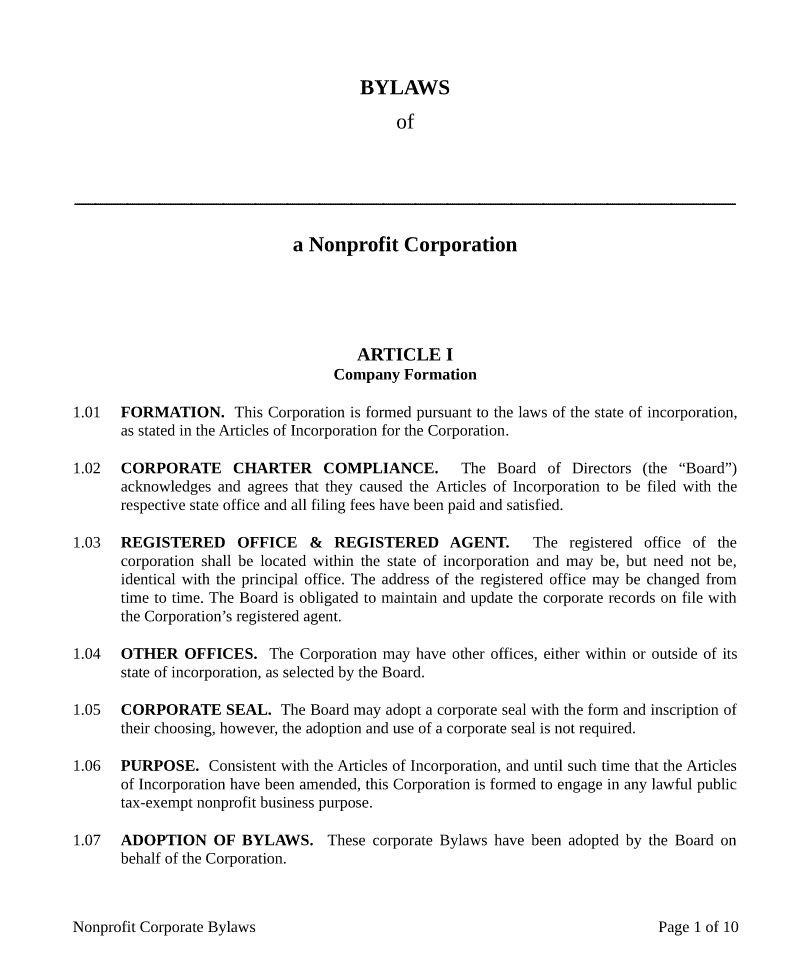Connecticut Nonprofit Bylaws
Connecticut nonprofit bylaws help organize and provide an internal operating manual of rules and procedures for your nonprofit. Bylaws establish the day-to-day operations, how your nonprofit elects officers, what the size of your board is, and how meetings are held. Creating bylaws gives your nonprofit an organizational structure and rule book to guide you, your business, and your employees if any issues were ever to arise.
Check out our attorney-drafted bylaws template and get started today.
Why does a Connecticut nonprofit need bylaws?
While you don’t have to file your Connecticut nonprofit bylaws with the Connecticut Secretary of State like your Connecticut Nonprofit Certificate of Incorporation, drafting bylaws helps keep everyone on the same page about how your business should be run. Here are some things to keep in mind about Connecticut nonprofit bylaws:
1. Nonprofit bylaws are legally required in Connecticut.
According to CT Code Sec. 33-1030, the “incorporators or board of directors of a corporation shall adopt initial bylaws for the corporation.” Connecticut nonprofit bylaws are official legal documents legally required by the Connecticut Secretary of State.
2. Third parties will ask to see your bylaws.
While your Connecticut nonprofit bylaws aren’t required to be made public, you’ll still be asked to provide them throughout the course of running your business. To obtain 501(c) tax-exempt status for your nonprofit, you’ll have to show your bylaws. Want to open a bank account in Connecticut for your nonprofit? You’ll also need to provide your bylaws along with other official documentation to prove your nonprofit’s legitimacy.
3. Nonprofit bylaws allow you more control over your nonprofit.
Without bylaws, your nonprofit is operating in bad standing in Connecticut. It also doesn’t have a clear direction for how your business should operate. Nonprofit bylaws allow you and your board of directors an operating agreement for how your nonprofit should run to stay in legal good standing and without any issues.
Want to learn more? Check out our Guide to Nonprofits.
What do Connecticut Nonprofit Bylaws include?
Bylaws for your Connecticut nonprofit include all the essential information about your nonprofit like name, business address, and purpose. Your nonprofit bylaws should also contain specific rules for how your nonprofit internally operates. Your Connecticut nonprofit bylaws provide your board of directors direct and clear guidance on how to run your nonprofit, so your bylaws need to have rules for:
- appointing and removing board members
- notifying members of board meetings and setting locations
- voting and meeting quorum requirements
- treating conflicts of interest
- compensating directors
- maintaining records and meeting minutes
- amending bylaws
- operating under emergency bylaws
Are nonprofit bylaws legally binding?
Yes. In Connecticut, nonprofit bylaws are considered legally required and contractually binding. Anything done by you or a member of the nonprofit against the bylaws can lead to legal ramifications. Connecticut nonprofit bylaws can also be used in a court of law and accessed by members’ attorneys.
Are nonprofit bylaws public record?
It depends. Connecticut nonprofit bylaws aren’t required to be publicly filed, but that changes if you’re looking to apply for 501(c)(3) tax-exempt status. The IRS has nonprofits attach their bylaws when nonprofits file. The IRS then makes your nonprofit bylaws and application public.
FAQs
No. The Connecticut Secretary of State does not require signatures on nonprofit bylaws. However, we highly recommend it. Including signatures from all board members and officers creates an understanding and legitimacy for your nonprofit.
Depends. CT Code Sec. 33-1150 states that your nonprofit board of directors may amend your bylaws unless your certificate of incorporation reserves that power for the members.
The incorporators or board of directors adopts the nonprofits initial bylaws at the first organizational meeting.
